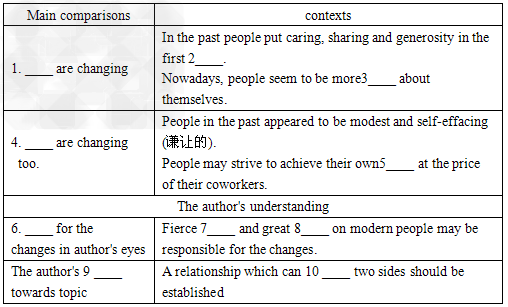阅读理解。
When I was a boy every holiday that I had seemed perfect. My parents took me by train or by car to a
hotel by the sea. All day, I seem to remember. I played on the sands with strange exciting children. We make
sandcastles with huge yellow walls, and watched the incoming tide destroy them; we splashed each other in
the water and shrieked with excitement. When the tide went out, we climbed over the slippery rocks and
stared down at the fish and the seaweed in the rock-pools.
In those far-off days the sun seemed to shine constantly and the water was always warm. Sometimes we
left the beach and walked in the country, exploring ruined houses and dark woods and climbing trees that
overhung streams. There were always sweets in one's pockets or convenient places where one could buy ice-
creams. Each day seemed a life-time.
Although I am now an adult, my idea of a good holiday is much the same as it was. I still like the sun and
the warm sand and the sound of waves breaking on the beach. I no longer wish to build sandcastles and I
dislike sweets instantly, but I look forward to sitting down to a good meal and a bottle of wine in the evening.
I think, too, that I prefer spending my holiday abroad. I want to smell different smells; I want to see
different kinds of trees, flowers and birds; and I also want to see people with different colored skins, wearing
different kinds of clothes. Above all, I want to hear a different language spoken and listen to different musical
rhythms from those I am used to.
But I still need my companions-not, of course, to play on the sands and eat ices with, but to drink with and
talk to on warm moonlit nights.
Sometimes I wonder what my perfect holiday will be when I am old. All I shall want to do then, I expect,
will be to lie in bed, reading books about children who make sandcastles with huge yellow walls, who watch
the incoming tide, who make themselves sick on too many ices…
1. Where did the author mostly spend his holidays when he was young? [ ]
A. In the countryside.
B. On the beach.
C. In the mountains.
D. On the sea.
2. What does the underlined word "shrieked" in Paragraph 1 mean? [ ]
A. shouted
B. swam
C. struggled
D. surfed
3. What now interests the author as an adult is _____. [ ]
A. to enjoy a nice dinner
B. to spend his holiday sunbathing
C. to chat with someone
D. to experience a foreign culture
4. When the author grows old, he expects that _____. [ ]
A. he will read more books about children
B. he will lie in bed without worrying about anything
C. he will bring back wonderful childhood memories from a book
D. he will make sandcastles with his children

